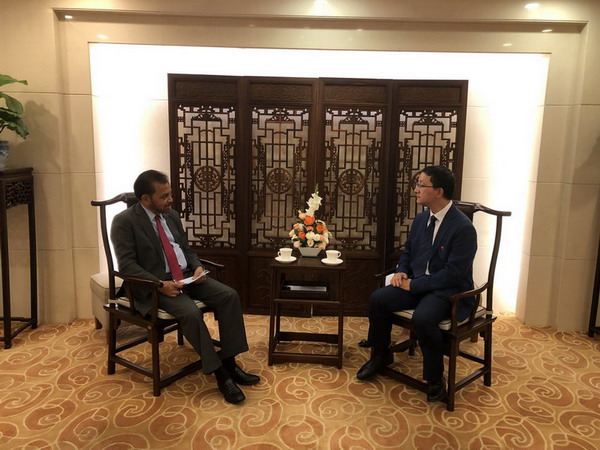
On August 30, 2022, Director-General of the Department of Asian Affairs of the Foreign Ministry Liu Jinsong met with Ambassador of Sri Lanka to China Dr. Palitha Kohona. The two sides had a cordial and friendly exchange of views on China-Sri Lanka relations and international and regional issues of common concern.
Liu Jinsong said that in recent days, Mr. Ambassador frequently participated in activities and gave interviews to the media, actively promoted exchanges and cooperation between China and Sri Lanka in various fields, publicly refuted the so-called "China's debt trap" claim, and safeguarded and promoted China-Sri Lanka relations and the traditional friendship. I appreciate this. As traditional friendly neighbors, China and Sri Lanka always promote the strategic cooperative partnership in the spirit of the Rubber-Rice Pact. China supports the efforts of the Sri Lankan government and various sectors to consolidate political stability for the long-term interests of the country, and create favorable conditions for overcoming difficulties, improving people's well-being and reviving the economy. China will continue to provide assistance within its capacity for the Sri Lankan government and people.
Liu Jinsong said that what lies behind Sri Lanka's current economic and financial crisis are not only structural problems of its economy and unexpected factors such as the pandemic, but also adverse spillover effects brought by the US Federal Reserve's monetary policy. As the US media pointed out, a strong US dollar is hurting all countries except the US. According to the International Monetary Fund's estimates, about 60 percent of low-income countries are at high risk of or already in debt distress, compared with 20 percent a decade ago. A strong US dollar harms low-income countries in three aspects: First, it increases financial pressure. Countries have to bear a heavier burden of foreign debts denominated in US dollars and rising costs of importing food, medicine and fuel, which will eventually lead to the depletion of foreign exchange reserves. Second, it encourages capital flight. When currencies depreciate against the US dollar, investors will begin to withdraw their capital and hide their money in safer places, thus further worsening countries' financial problems. Third, it affects economic growth. Enterprises cannot afford the costs of imports that are needed for their operations, and even if demand remains strong, they cannot sell enough products, thus affecting economic output.
Liu Jinsong stressed that Speaker of the US House of Representatives Nancy Pelosi, in disregard of China's stern warnings, insisted on visiting China's Taiwan region recently. This is a gross violation of China's sovereignty and territorial integrity and has a severe impact on the political foundation of China-US relations. It gravely undermines peace and stability across the Taiwan Strait, and seriously violates international law and the basic norms governing international relations. It has aroused strong indignation among the 1.4 billion-plus Chinese people, and China has every reason to respond with resolute countermeasures. China appreciates Sri Lanka's firm support for the one-China principle. China and Sri Lanka will continue to firmly support each other on issues concerning respective core interests, and jointly uphold the principle of non-interference in internal affairs, which is a "golden rule" of international relations and the essential safeguard for developing countries to maintain security and independence.
Kohona introduced Sri Lanka's efforts to restore social order, expressed gratitude for China's invaluable support during Sri Lanka's trying times, and said that Sri Lanka is keenly aware of the fact that only by realizing development can it truly get out of difficulties. Sri Lanka attaches great importance to China's status and influence as a global super-large market and a major source of overseas investment, and looks forward to deepening mutually beneficial cooperation between the two countries in trade, investment, finance, tourism, education, people's well-being and other fields, so as to help Sri Lanka tide over the difficulties and resume development.
Kohona stressed that Sri Lanka always adheres to the one-China principle and opposes acts that interfere in other countries' internal affairs. Currently, some countries politicize and weaponize human rights issues to exert pressure on other countries. Sri Lanka is ready to work with China to strengthen high-level strategic coordination in bilateral and multilateral fields, safeguard legitimate rights and interests of the two countries and the vast developing countries, and promote greater democracy in international relations.
